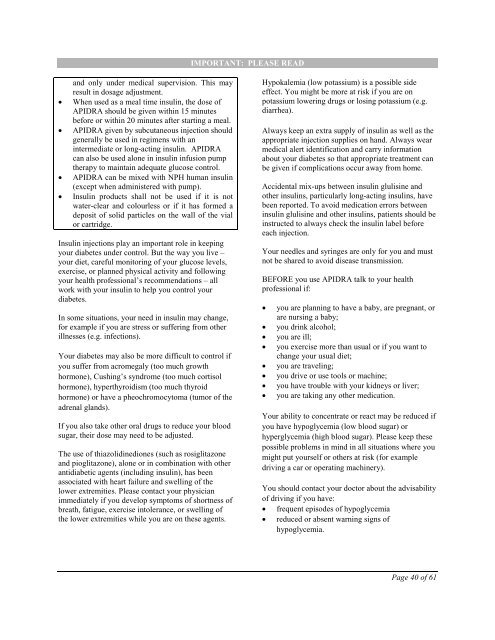Apidra (insulin glulisine) - Sanofi Canada
Apidra (insulin glulisine) - Sanofi Canada
Apidra (insulin glulisine) - Sanofi Canada
Create successful ePaper yourself
Turn your PDF publications into a flip-book with our unique Google optimized e-Paper software.
and only under medical supervision. This may<br />
result in dosage adjustment.<br />
• When used as a meal time <strong>insulin</strong>, the dose of<br />
APIDRA should be given within 15 minutes<br />
before or within 20 minutes after starting a meal.<br />
• APIDRA given by subcutaneous injection should<br />
generally be used in regimens with an<br />
intermediate or long-acting <strong>insulin</strong>. APIDRA<br />
can also be used alone in <strong>insulin</strong> infusion pump<br />
therapy to maintain adequate glucose control.<br />
• APIDRA can be mixed with NPH human <strong>insulin</strong><br />
(except when administered with pump).<br />
• Insulin products shall not be used if it is not<br />
water-clear and colourless or if it has formed a<br />
deposit of solid particles on the wall of the vial<br />
or cartridge.<br />
Insulin injections play an important role in keeping<br />
your diabetes under control. But the way you live –<br />
your diet, careful monitoring of your glucose levels,<br />
exercise, or planned physical activity and following<br />
your health professional’s recommendations – all<br />
work with your <strong>insulin</strong> to help you control your<br />
diabetes.<br />
In some situations, your need in <strong>insulin</strong> may change,<br />
for example if you are stress or suffering from other<br />
illnesses (e.g. infections).<br />
Your diabetes may also be more difficult to control if<br />
you suffer from acromegaly (too much growth<br />
hormone), Cushing’s syndrome (too much cortisol<br />
hormone), hyperthyroidism (too much thyroid<br />
hormone) or have a pheochromocytoma (tumor of the<br />
adrenal glands).<br />
If you also take other oral drugs to reduce your blood<br />
sugar, their dose may need to be adjusted.<br />
The use of thiazolidinediones (such as rosiglitazone<br />
and pioglitazone), alone or in combination with other<br />
antidiabetic agents (including <strong>insulin</strong>), has been<br />
associated with heart failure and swelling of the<br />
lower extremities. Please contact your physician<br />
immediately if you develop symptoms of shortness of<br />
breath, fatigue, exercise intolerance, or swelling of<br />
the lower extremities while you are on these agents.<br />
IMPORTANT: PLEASE READ<br />
Hypokalemia (low potassium) is a possible side<br />
effect. You might be more at risk if you are on<br />
potassium lowering drugs or losing potassium (e.g.<br />
diarrhea).<br />
Always keep an extra supply of <strong>insulin</strong> as well as the<br />
appropriate injection supplies on hand. Always wear<br />
medical alert identification and carry information<br />
about your diabetes so that appropriate treatment can<br />
be given if complications occur away from home.<br />
Accidental mix-ups between <strong>insulin</strong> <strong>glulisine</strong> and<br />
other <strong>insulin</strong>s, particularly long-acting <strong>insulin</strong>s, have<br />
been reported. To avoid medication errors between<br />
<strong>insulin</strong> <strong>glulisine</strong> and other <strong>insulin</strong>s, patients should be<br />
instructed to always check the <strong>insulin</strong> label before<br />
each injection.<br />
Your needles and syringes are only for you and must<br />
not be shared to avoid disease transmission.<br />
BEFORE you use APIDRA talk to your health<br />
professional if:<br />
• you are planning to have a baby, are pregnant, or<br />
are nursing a baby;<br />
• you drink alcohol;<br />
• you are ill;<br />
• you exercise more than usual or if you want to<br />
change your usual diet;<br />
• you are traveling;<br />
• you drive or use tools or machine;<br />
• you have trouble with your kidneys or liver;<br />
• you are taking any other medication.<br />
Your ability to concentrate or react may be reduced if<br />
you have hypoglycemia (low blood sugar) or<br />
hyperglycemia (high blood sugar). Please keep these<br />
possible problems in mind in all situations where you<br />
might put yourself or others at risk (for example<br />
driving a car or operating machinery).<br />
You should contact your doctor about the advisability<br />
of driving if you have:<br />
• frequent episodes of hypoglycemia<br />
• reduced or absent warning signs of<br />
hypoglycemia.<br />
Page 40 of 61

















